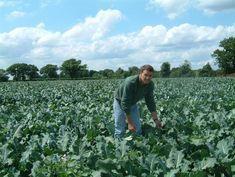
Situated near Boston in Lincolnshire, Marshalls is a family-owned business renowned for the specialist production and packing of conventional fresh vegetables. For more than 50 years, Marshalls has served the multiple, processing and food service sectors, and in 1998, moved into the organic market with its own organic land, coupled with a dedicated organic supply base.
“In 2004, our organic land bank has risen to around 2000 hectares providing us with an ever-expanding portfolio for our customers,” says organic account manager, Dan Carr. “Our organic portfolio is made up of broccoli, purple sprouting broccoli, cauliflower, pointed cabbage, Savoy cabbage, courgettes, leeks, celeriac, spinach, pumpkins and artichokes. We have seen exceptional growth on organics in the last 12 months and all lines have shown year-on-year growth. Availability has been the main driver of this growth, and most products now have 12 months of the year availability. We have also run successful promotional campaigns with our customers to promote organics, which I feel have been successful in increasing penetration and average weekly purchases.”
Organics is not just about product, Carr continues. “I think there is an increased focus on packaging organic produce and I totally agree with it,” he says. “As an organic producer and packer I see it as our responsibility to be as eco-friendly as possible. We have worked very closely with our supplies on this topic, and throughout our current portfolio, products are now being packaged in bio-degradable nets, films and trays. We are also looking at some new bio-degradable packaging which will hopefully be introduced in the very near future.”
This year has been very difficult for growing brassicas in the UK says Carr. “During our summer production, we had record-breaking temperatures with very little rain. These two factors caused heavy stress on our production. Summers in the UK seem to be getting hotter and drier each year. Because of this we are constantly reviewing our husbandry techniques and varietal selection in order to achieve quality and availability.
“Five to 10 years ago there were problems with the continuity of supply across organic lines, however I now feel those problems are disappearing due to higher organic land availability, better husbandry techniques and improved variety selection,” he says. “Currently the biggest barrier for organics is its retail entry point against conventional produce. A large percentage of people will not pay the extra premium for organics - we need to be educating consumers on the benefits of organic produce and explaining why there is a premium.”



